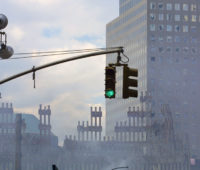In January, 1981, the Islamic Republic of Iran released 52 Americans whom the revolutionary students occupying the Tehran embassy had held for 444 days. This ended a traumatic intrusion of Middle Eastern politics upon the American psyche. Unimaginable only two years before, the trauma has clouded our dreams and our memories ever since. Twenty years […]
Terrorist attacks on and since September 11th have stimulated public soul-searching, military and diplomatic responses, and efforts to reform public policy. Both the attacks and responses to them have raised a host of questions about social organization, basic social institutions, how people mobilize amid crises, and how differences of culture and politics shape conflict and cooperation.
This website features an extraordinary and still-expanding collection of essays by leading social scientists from around the country and the world. These are efforts by social scientists to bring theoretical and empirical knowledge to bear on the events of Sept. 11, their precursors, and what comes after.
We have asked the authors of these essays to write against two-week deadlines. Much to their credit they have obliged, even when it is difficult to come by sure knowledge in a time of quickly changing circumstances.
These essays are intended as resources for teachers—especially college and university instructors—who want to address the unfolding events in their courses from the perspectives of the social sciences. We hope they may also serve journalists and others who seek a guide to academic knowledge related to these events. Not least they are for all of us who seek deeper understanding in troubling times.
Ten years after these essays were published, contributors to After September 11 were asked to reflect on what they wrote and to explore what had changed and what remained the same since those harrowing times, resulting in the essay collection 10 Years after September 11.
Terrorism and Cosmopolitanism
by Daniele ArchibugiThe fall of the Berlin Wall was a symbolic event that raised hopes for a more united world, founded on the values of international legality and democracy. The idea was put forward that, at last, human rights would be respected planet-wide and that violent conflict would gradually disappear. In just over a decade, many such […]
Networks of Dissent: Islamism and Reform in Saudi Arabia
by Gwenn OkruhlikThe following essay will be forthcoming in Current History. Our thanks to the editors for allowing the essay to appear here. The politics of Islamist dissent in Saudi Arabia have come under intense scrutiny since September 11. This is hardly surprising. Osama bin Laden is Saudi Arabian by birth and upbringing. Suspicion existed for some […]
Violence, Law and Justice in a Global Age
by David HeldOn Sunday, 23rd September 2001, the novelist, Barbara Kingsolver wrote in The Los Angeles Times: ‘It’s the worst thing that’s happened, but only this week. Two years ago, an earthquake in Turkey killed 17,000 people in a day, babies and mothers and businessmen…. The November before that, a hurricane hit Honduras and Nicaragua and killed […]
Is Cyber Terror Next?
by Dorothy E. DenningShortly after the September 11 terrorist attack against the United States, hackers took to the Internet to voice their rage. A group called the Dispatchers announced they would destroy Web servers and Internet access in Afghanistan and target nations that support terrorists. Led by a 21-year-old security worker “Hackah Jak” from Ohio, the group of […]
Unholy Politics
by Seyla BenhabibIt has become clear since September 11 that we are faced with a new form of struggle that threatens to dissolve the boundaries of the political in liberal democracies. The terror network of Osama bin Laden, and its various branches in Egypt, Pakistan, Malaysia, Indonesia, Algeria, and among Islamist groups in western Europe, is wider, […]
Some Thoughts Subsequent to September 11th
by Bruce CumingsI remember . . . remarking on the criminal futility of the whole thing, doctrine, action, mentality; and on the contemptible aspect of the half-crazy pose as of a brazen cheat exploiting the poignant miseries and passionate credulities of a mankind always so tragically eager for self-destruction . . . a blood-stained inanity of so […]
Can Rational Analysis Break a Taboo? A Middle Eastern Perspective
by Said Amir ArjomandI happened to be in Beirut in mid-May, when the Israeli retaliatory raids began to escalate. My host called me at midnight, after I had gone to bed, to come and see what was happening. I saw on the TV screen, as did millions in the Middle East, pictures of the continuing fire caused by […]
Afghanistan and Threats to Human Security
by Barnett RubinThe concept of human security unifies fields of policy and analysis that have conventionally been kept separate: humanitarianism and development on the one hand, and international security on the other. For years, those concerned with the suffering and ordeals of the people of Afghanistan found it hard to gain a hearing in the precincts of […]
The Reach of Transnationalism
by Riva KastoryanoSeptember 11 shook the imagination with an intensity like the attack itself. The first question people asked was Who would commit such a crime? Tied to this was another question: who was capable of carrying it out? Obviously, such an “action” was the work (indeed the “l’oeuvre”) of a well organized group with a great […]












